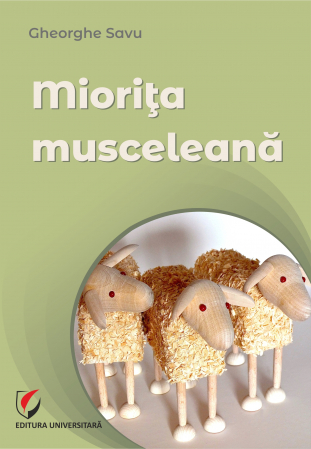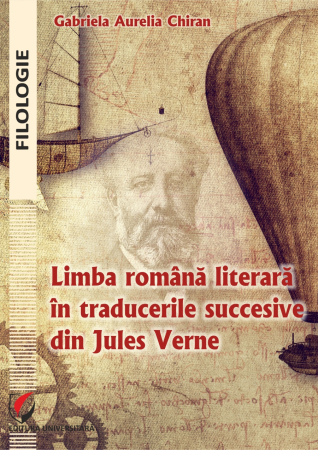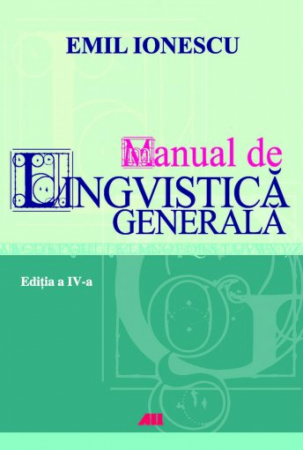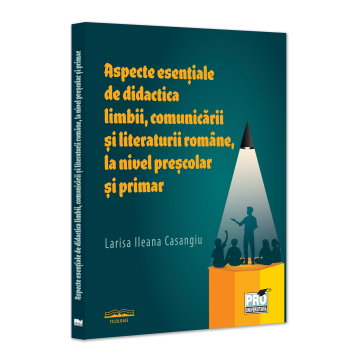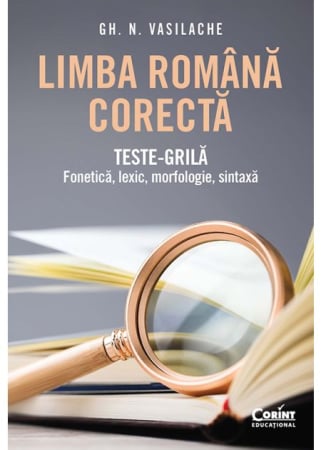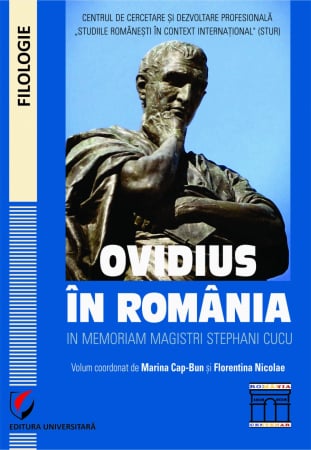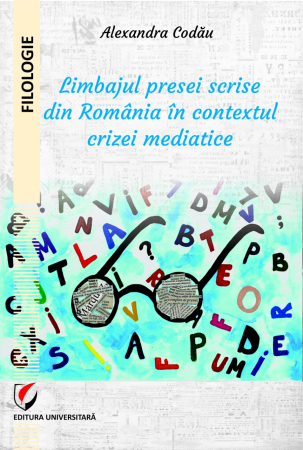Manuscript proposals: [email protected] / 0745 204 115 //// Tracking orders Individuals / Sales: 0745 200 357 / Orders Legal entities: 0721 722 783
Publisher: Editura Universitară
Author: Florin Lobont, Marian Vasile, Valeriu Sofronie
ISBN: 978-606-28-1266-9
DOI: https://doi.org/10.5682/9786062812669
Publisher year: 2021
Edition: I
Pages: 368
Product Code:
9786062812669
Do you need help?
0745 200 357
- Description
- Download (1)
- Authors
- Content
- More details
- Reviews (0)
It is amazing how many ways Lucian Blaga can be read and understood! More than a hundred years have passed since the appearance of his first works, and the praises that greeted him then continue to do so today. Instead of losing their intensity, they continually opened and deepened their meanings, gradually turning into universal goods. Year after year, books and articles appear meant to highlight a new or another aspect of his work, which manages, almost paradoxically, to develop an amazing baroque complexity, without falling into unintelligibility. In part, the secret of the fecundity and seduction of Blagian thought lies in the poetic plasticity of philosophical writing and in the conceptual-philosophical harmony of his poetry and prose. Year after year, a large number of college graduates (philosophy, letters, sociology, anthropology, theology, arts) choose their bachelor's or doctoral theses with a Blagian theme. Also, philosophers, historians and literary critics, estheticians, science theorists, sociologists, theologians, etc. they do not restrain themselves from joining in idea and emotion the one who becomes, more and more deeply, Master, sharpening his thought and feeling, refining them. It is a homage that is constantly growing, despite (or perhaps precisely as a statement of the non-linear permanence of the Time of the great philosopher-artist) the fact that Blaga did not want disciples and did not imagine the founder of the school. This work, bringing together names from the country and abroad, specialists in Blaga's work, but also ardent admirers, is a tribute to his creative power.
Coordinators
Coordinators
-
The last Blaga
Download
Coordonatori
FLORIN LOBONT
MARIAN VASILE
VALERIU SOFRONIE
FLORIN LOBONT
MARIAN VASILE
VALERIU SOFRONIE
Instead of introduction: A storyteller / 5
Thanks / 8
Giancarlo Baffo, Gnosis without redemption: the philosophy of culture of Lucian Blaga / 10
Ioan Biris, On the constructivist character of modern scientific knowledge: Lucian Blaga and Ernst Cassirer / 50
Ionel Buse, “Poetic” Affinities at Bachelard and Blaga / 73
Dan Carbarau, Fundamental concepts of research / 91
Geta Cozma, Flight Modulation / 100
Daniel Cristea Enache, About the poetry of Lucian Blaga / 114
Pavel Farcau, The positivism of transcendent censorship as a way to hide the understanding of the phenomenon of death in Blaga's philosophy / 132
Sebastian Grama, In everything. From one / 146
Adrian Lesenciuc, His point in Blaga's work / 150
Petrisor Militaru, The Blagian Lyrical Universe and Htonic Magic. Clay, hearth and blood / 156
Andreea Neagu, The ontological dimension of the aesthetic experience: Blaga and Gadamer / 168
Eugeniu Nistor, Relatia etnografie filosofie in publicistica lui Lucian Blaga / 184
Aurel Pantea, Personality and / or transcendent function / 194
Ovidiu Pecican, Reciting Blaga: Saint Sophia / 210
Alexandru Petrescu, The specificity, originality and actuality of the Blagian perspective on science / 215
Ioan N. Rosca, Blaga about time as a cultural-historical destiny in the current context / 260
Rainer Schubert, The Birth of Metaphor and the Meaning of Culture. An introduction / 282
Valeriu Sofronie, Year 1929: The end of innocence / 296
Monica Stan, The Beginnings of Lucian Blaga in Romanian Culture / 332
Marian Vasile, - Me ?! Not! I am crushing the corolla of the wonders of the world! / 344
Alexandru Anastasiu, Dragonflies in the desert. The Lost / 351
Daria Musat, Daria / 355
Stefan-Marius Lacatas, The function of love in Lucian Blaga / 359
General data about the coordinators and authors of the paper / 363
Thanks / 8
Giancarlo Baffo, Gnosis without redemption: the philosophy of culture of Lucian Blaga / 10
Ioan Biris, On the constructivist character of modern scientific knowledge: Lucian Blaga and Ernst Cassirer / 50
Ionel Buse, “Poetic” Affinities at Bachelard and Blaga / 73
Dan Carbarau, Fundamental concepts of research / 91
Geta Cozma, Flight Modulation / 100
Daniel Cristea Enache, About the poetry of Lucian Blaga / 114
Pavel Farcau, The positivism of transcendent censorship as a way to hide the understanding of the phenomenon of death in Blaga's philosophy / 132
Sebastian Grama, In everything. From one / 146
Adrian Lesenciuc, His point in Blaga's work / 150
Petrisor Militaru, The Blagian Lyrical Universe and Htonic Magic. Clay, hearth and blood / 156
Andreea Neagu, The ontological dimension of the aesthetic experience: Blaga and Gadamer / 168
Eugeniu Nistor, Relatia etnografie filosofie in publicistica lui Lucian Blaga / 184
Aurel Pantea, Personality and / or transcendent function / 194
Ovidiu Pecican, Reciting Blaga: Saint Sophia / 210
Alexandru Petrescu, The specificity, originality and actuality of the Blagian perspective on science / 215
Ioan N. Rosca, Blaga about time as a cultural-historical destiny in the current context / 260
Rainer Schubert, The Birth of Metaphor and the Meaning of Culture. An introduction / 282
Valeriu Sofronie, Year 1929: The end of innocence / 296
Monica Stan, The Beginnings of Lucian Blaga in Romanian Culture / 332
Marian Vasile, - Me ?! Not! I am crushing the corolla of the wonders of the world! / 344
Alexandru Anastasiu, Dragonflies in the desert. The Lost / 351
Daria Musat, Daria / 355
Stefan-Marius Lacatas, The function of love in Lucian Blaga / 359
General data about the coordinators and authors of the paper / 363
Conversely followed chronologically, from the last works to the beginning, Lucian Blaga's philosophy is more like a story. In the pages of this story we find that a lone God decides, we do not know the reasons (we will never know), to set in motion a World, within which another being, second, derived from the work of the first, tries hard to reconstitutes the first Road. It is understood that God was the first narrator. His creation is his story. Blaga does not fail to remind us of this: "The world (of the god - n.n.) is an infinitely mutilated story." Why mutilated? Because the god likes happy ending stories. Even if man is metaphysically saddened to death that he cannot see the end of the road, God overflows with happiness: and has thus ensured the continuation of his hegemony. As things happen, the story is answered with another. This time, we have the story of man. The man character in the first story, becomes, in the second, the author, and the God, the central character. Neither spoils the other too much, taking him out into the world "mutilated". It looks more like a Blind Baba game in which the authors of both stories get lost in the game of mirrors. No one wants to be found; everyone is hiding.
Let's go back to "Blaga's story". Viewed from his "keystone", metaphysics, all the directions he tried become the "stones" of his story. He founded knowledge, discovering the ecstatic intellect (according to Blaga) capable of making the leap into transcendence, that is, into mystery. He legitimized culture, redefining metaphor and style, so that he became able to "catch" the echo of transcendence. He also grounded human history, putting style to work. After all, the values - have always reached the same metaphysical center - the Great Anonymous. What is not philosophy at Blaga (poetry and drama) is a multiple story. But all, bigger or smaller stories, eventually reach a god. And the circle closes. Alt happy ending!
A moral detached from this would be that philosophical storytellers and their philosophies, so closely resembling stories, cannot become "school founders." They cannot have disciples. What else can you add to Creanga's stories? Blaga cannot be continued in the way he himself built the building, piece by piece. The story was told to the end, being only his. Here, another hegemony assured! But, insofar as we like it, it becomes ours. His story is too connected to myth to look for his correspondents in the truths of science. But there is also knowledge, to be depersonalized in myth. The science and philosophy practiced by him remain pretexts for writing the Great Story. Nothing in Blaga seems to have significance outside of the Story.
The fate of stories is that they can always be reread. Stories never grow old. Let's just think of the hypothesis provided by some Australian researchers, after which the oldest story in the world was dated more than 35,000 years ago. Here, the story has reached the present, overcoming time, but the people who gave it life have remained in the past. Even those who have listened for so many thousands of years no longer exist. A contemporary scientist, correcting the Darwinian theory of the origin of species, believes that the meaning of the evolution of life on Earth does not depend on the selection of the best suited individual or even the group. The meaning of evolution goes in the direction of selfish genes, which use biological aggregates to perpetuate themselves. Like the gene, the Story (The Great "Meme", to speak in the language of the famous biologist) is also selfish: it does everything in its power, inventing increasingly complex societies (true extended human phenotypes) to propagate in time. Perhaps man's destiny is to pass on the Story of the Selfish Story.
Blaga's chance at permanence depends not so much on his philosophical genius, on the sensitivity with which he was endowed, but on his quality as a good storyteller. Metaphysical narrator. There are Romanian philosophers who are just as sensitive and brilliant, but who did not love philosophical stories. The consequence was that history forgot them. There are museum pieces left, frequented only for biblio-economic reasons. They were too dependent on the time they thought and wrote to tell something to the more distant generations, more concerned with their own stories. But Blaga is still read today. And we believe that this will be done tomorrow. Each generation will match its story with its own.
The authors of this essay, belonging to several generations, several cultural epistemes and several peoples, read his story and rejoiced. In response to this joy, they tried to tell others, in the present essays, why this happened. We all love stories.
A conclusion comes to mind (from a story of God): Maybe this world (The Story of God) will pass, but this story (The Story of Man) will not pass!
One last clarification. We want to see, together with the reader, beyond what has stood, from the man within the philosopher, under time. Thus, we chose to delimit ourselves from the controversial facets of his associations with totalitarian figures or institutions by bringing, in the pages of this volume, some commentators, including foreigners, who highlight the great openings to universality, not small gestures, be they opportunistic. , be simply naive, undeniably present in his biography.
Publishers / Coordinators
Let's go back to "Blaga's story". Viewed from his "keystone", metaphysics, all the directions he tried become the "stones" of his story. He founded knowledge, discovering the ecstatic intellect (according to Blaga) capable of making the leap into transcendence, that is, into mystery. He legitimized culture, redefining metaphor and style, so that he became able to "catch" the echo of transcendence. He also grounded human history, putting style to work. After all, the values - have always reached the same metaphysical center - the Great Anonymous. What is not philosophy at Blaga (poetry and drama) is a multiple story. But all, bigger or smaller stories, eventually reach a god. And the circle closes. Alt happy ending!
A moral detached from this would be that philosophical storytellers and their philosophies, so closely resembling stories, cannot become "school founders." They cannot have disciples. What else can you add to Creanga's stories? Blaga cannot be continued in the way he himself built the building, piece by piece. The story was told to the end, being only his. Here, another hegemony assured! But, insofar as we like it, it becomes ours. His story is too connected to myth to look for his correspondents in the truths of science. But there is also knowledge, to be depersonalized in myth. The science and philosophy practiced by him remain pretexts for writing the Great Story. Nothing in Blaga seems to have significance outside of the Story.
The fate of stories is that they can always be reread. Stories never grow old. Let's just think of the hypothesis provided by some Australian researchers, after which the oldest story in the world was dated more than 35,000 years ago. Here, the story has reached the present, overcoming time, but the people who gave it life have remained in the past. Even those who have listened for so many thousands of years no longer exist. A contemporary scientist, correcting the Darwinian theory of the origin of species, believes that the meaning of the evolution of life on Earth does not depend on the selection of the best suited individual or even the group. The meaning of evolution goes in the direction of selfish genes, which use biological aggregates to perpetuate themselves. Like the gene, the Story (The Great "Meme", to speak in the language of the famous biologist) is also selfish: it does everything in its power, inventing increasingly complex societies (true extended human phenotypes) to propagate in time. Perhaps man's destiny is to pass on the Story of the Selfish Story.
Blaga's chance at permanence depends not so much on his philosophical genius, on the sensitivity with which he was endowed, but on his quality as a good storyteller. Metaphysical narrator. There are Romanian philosophers who are just as sensitive and brilliant, but who did not love philosophical stories. The consequence was that history forgot them. There are museum pieces left, frequented only for biblio-economic reasons. They were too dependent on the time they thought and wrote to tell something to the more distant generations, more concerned with their own stories. But Blaga is still read today. And we believe that this will be done tomorrow. Each generation will match its story with its own.
The authors of this essay, belonging to several generations, several cultural epistemes and several peoples, read his story and rejoiced. In response to this joy, they tried to tell others, in the present essays, why this happened. We all love stories.
A conclusion comes to mind (from a story of God): Maybe this world (The Story of God) will pass, but this story (The Story of Man) will not pass!
One last clarification. We want to see, together with the reader, beyond what has stood, from the man within the philosopher, under time. Thus, we chose to delimit ourselves from the controversial facets of his associations with totalitarian figures or institutions by bringing, in the pages of this volume, some commentators, including foreigners, who highlight the great openings to universality, not small gestures, be they opportunistic. , be simply naive, undeniably present in his biography.
Publishers / Coordinators
If you want to express your opinion about this product you can add a review.
write a review

6359.png)
![The last Blaga [1] The last Blaga [1]](https://gomagcdn.ro/domains/editurauniversitara.ro/files/product/large/sofronie_ultimul-blaga_bt-3115-5803.jpg)
